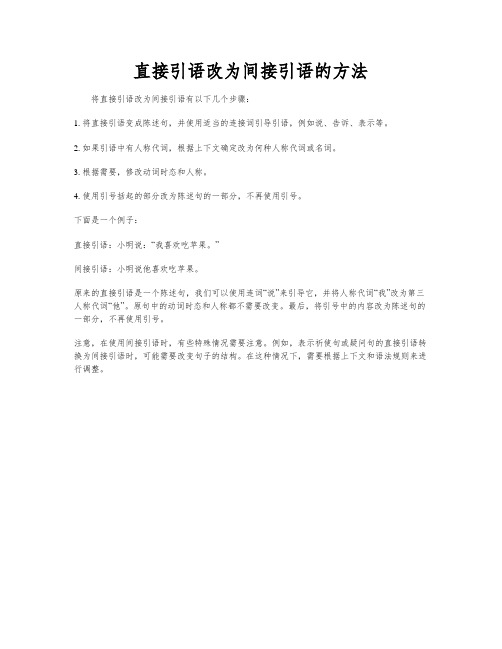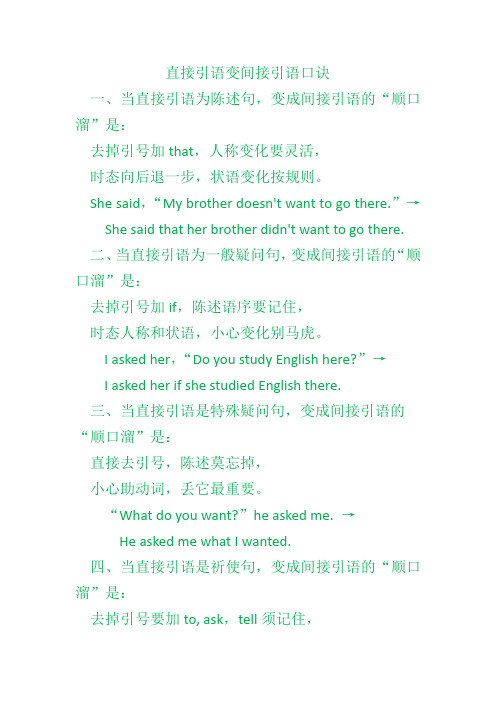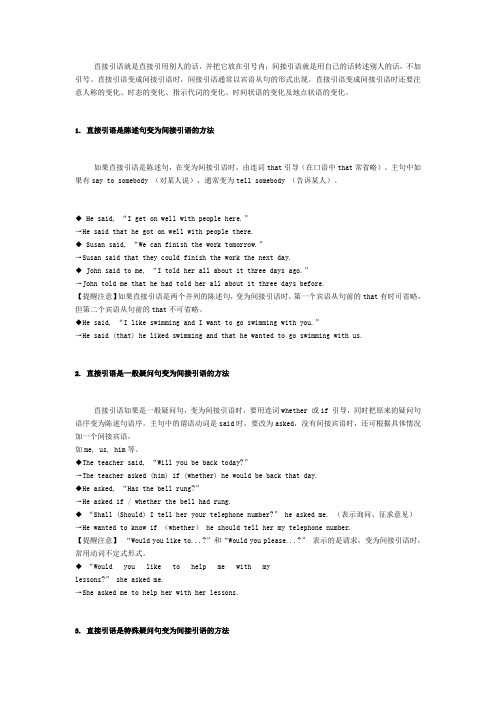陈述句与疑问句由直接引语变间接引语的方法
陈述句的直接引语变间接引语

陈述句的直接引语变间接引语作者:林世生来源:本站原创更新时间:2006-03-15点击数:1970陈述句的直接引语变间接引语直接引语是陈述句时,若变成间接引语,结构上是将原先的单独一个句子变成一个宾语从句。
如He said,“I can speak English.”这句话变成间接引语则是:He said that he could speak English.原先的单独一句I can speak English变成了that he could speak English 作said的宾语了。
直接引语是陈述句变成间接引语时,存在引导从句的连接词问题。
事实上,直接引语是陈述句时,变成间接引语后的连接词常是that,而且这个连词that常可以省去。
(1)在时态方面,若主句谓语动词是现在时,直接引语变成间接引语后的从句则无需变化;若直接引语中的内容是客观真理,直接引语变成间接引语时则无需变化。
但若主句是过去时,直接引语变成间接引语后的从句中动词时态变化规律是:现在时变过去时,过去时一般变过去完成时。
具体地说,直接引语中的一般现在时,现在进行时和一般将来时变成间接引语后分别变为一般过去时,过去进行时和过去将来时;一般过去时则变为过去完成时;直接引语中的过去进行时、过去完成时和过去将来时变成间接引语后则一般仍然维持原先在直接引语中的时态。
如:1.Henry said,“I don't want to stay here.”→Henry said that he didn't want to stay there.2.He will say,“The girl was lazy.”→He will tell you that the girl was lazy.(2)在人称方面,存在人称的变化,变化规律常常是:a.直接引语中的第一人称常跟主句的主语一致。
如:He said,“I have finished my homework.”→He said(that)he had finished his homework.b.直接引语中的第二人称常常依主句中位于动词后面的谈话对象而定,若后面没有谈话对象,则常变为第一人称。
直接引语变间接引语(带练习和答案)

直接引语变间接引语(带练习和答案)直接引语和间接引语直接引语就是直接引⽤别⼈的话。
间接引语就是⽤⾃⼰的话转述别⼈的话。
间接引语多为宾语从句。
1. 直接引语变间接引语的⽅法(1) 直接引语如果是陈述句,间接引语应改为由that引导的宾语从句。
(that可省略)She said, “Our bus will arrive in five minutes.”→She said (that) their bus would arrive in five minutes.(2) 直接引语如果是反意疑问句,选择疑问句或⼀般疑问句,间接引语应改为由whether或if引导的宾语从句。
(宾语从句必须⽤陈述句语序)He said, “Can you swim, John”→ He asked John if he could swim.“You have finished the homework, haven’t you” my mother asked.→ My mother asked me whether I had finished the homework.He asked, “Do you go to school by bus or by bike”→ He asked me if I went to school by bus or by bike.She says, “Is Tom an Englishman”→ She asks whether/if Tom is an Englishman.注:主句引述动词是say时,要改为ask或wonder等。
(3) 直接引语如果是特殊疑问句,间接引语应该改为由原来的疑问词引导的宾语从句。
(宾语从句必须⽤陈述句语序)She asked me, “When do they have their dinner”→ She asked me when they had their dinner.(4) 直接引语如果是祈使句,间接引语应改为“tell/ask/order sb.(not) to do sth.”句型。
直接引语和间接引语的转换详解直接引语和间接引语的转换规则

直接引语和间接引语的转换详解直接引语和间接引语的转换规则直接引语和间接引语的转换详解直接引语是指直接引用他人的原话或句子,在使用过程中必须用引号将其括起来并标明来源。
而间接引语则是对他人的原话或句子进行转述或概括,不需要使用引号。
在正式的写作中,我们需要根据特定的规则将直接引语转换为间接引语或将间接引语转换为直接引语。
本文将详细介绍直接引语和间接引语的转换规则与技巧。
一、直接引语转换为间接引语的规则1. 转述语句的变化:a) 当转述语句是陈述句时,将直接引语变为间接引语时,需将句子变为陈述句,并将谓语动词的时态改为与转述时的语境相符。
b) 当转述语句是一般疑问句时,将直接引语变为间接引语时,需将句子变为陈述句,并将谓语动词的时态改为与转述时的语境相符,并去掉疑问句的疑问词。
c) 当转述语句是特殊疑问句时,将直接引语变为间接引语时,需将句子变为陈述句,并将特殊疑问词改为宾语从句的引导词。
2. 人称、时态和指示代词的变化:a) 当转述语句中有第一人称时,需将其转换为第二或第三人称,根据具体的语境来决定。
b) 当转述语句涉及时态的转换时,需将其改变为适当的时态,以使其与转述时的语境相符。
c) 当转述语句中出现指示代词时,需要根据具体情况将之转换为适当的人称代词或名词。
3. 时空背景的变化:a) 当转述语句涉及时空背景的转换时,需根据转述时的语境,适当改变时间、地点等相关信息。
二、间接引语转换为直接引语的规则1. 引语的引用方式:a) 当直接引语引用他人的句子时,需使用引号将其括起,并标明来源。
b) 当直接引语引用他人的话时,需要使用引号并在后面标明来源。
2. 恢复转述语句的原貌:在将间接引语转换为直接引语时,需按照原作者的表达方式,恢复句子的结构和用词,保持原汁原味。
三、注意事项1. 文体和语境的保持:在转换直接引语和间接引语时,需根据具体的文体和语境来选择合适的表达方式和用词,以保持文章的连贯性和一致性。
直接引语变间接引语的用法

直接引语变间接引语的用法由直接引语变为间接引语,分以下情况:1、直接引语是陈述句时间接引语为that引导的宾语从句(口语中that可以省略),主句的引述动词主要有say ,tell, repeat, explain, think等。
He said, "You are younger than I.” He said (that) I was younger than him.2、直接引语是疑问句时间接引语为陈述语序:主句的谓语动词say 改为ask,或改为wonder, do not know, want to know, be not sure, be puzzled等。
(1)一般疑问句或反意疑问句变为if (whether)引导的宾语从句。
She said, "Do you often come here to read newspapers?"→She asked me if (或whether)I often went there to read newspapers.She asked me, "You have seen the film, haven’t you?"→She asked me whether(或if )I had seen the film.(2)选择疑问句变为whether….or 宾语从句。
I asked him, "Will you stay at home or go to a film tonight?"→I asked him whether he would stay at home or go to a film that night.(3)特殊疑问句变为由原来的疑问词引导的宾语从句。
He asked, "Where do you live?" →He asked me where I lived.3、直接引语是祈使句时间接引语为不定式,作ask , tell, beg, order, warn, advise等动词的宾语补足语(don’t 变为not ).The teacher said to the boy, "Open the window." →The teacher told the boy to open the window. His father said to him, “Don’t leave the door open.” →His father told him not to leave the door open.[注意](1)有些表示建议、提议、劝告或要求的祈使句,可以用suggest ,insist等动词加以转述。
直接引语改为间接引语的方法

直接引语改为间接引语的方法
将直接引语改为间接引语有以下几个步骤:
1. 将直接引语变成陈述句,并使用适当的连接词引导引语,例如说、告诉、表示等。
2. 如果引语中有人称代词,根据上下文确定改为何种人称代词或名词。
3. 根据需要,修改动词时态和人称。
4. 使用引号括起的部分改为陈述句的一部分,不再使用引号。
下面是一个例子:
直接引语:小明说:“我喜欢吃苹果。
”
间接引语:小明说他喜欢吃苹果。
原来的直接引语是一个陈述句,我们可以使用连词“说”来引导它,并将人称代词“我”改为第三人称代词“他”。
原句中的动词时态和人称都不需要改变。
最后,将引号中的内容改为陈述句的一部分,不再使用引号。
注意,在使用间接引语时,有些特殊情况需要注意。
例如,表示祈使句或疑问句的直接引语转换为间接引语时,可能需要改变句子的结构。
在这种情况下,需要根据上下文和语法规则来进行调整。
直接引语变间接引语口诀详解

直接引语变间接引语以及if条件句口诀人称,时态,状语始终变一主二宾三不变时态向后退一格状语变化见表格陈述that 可省略一般疑问用if(whether)特殊疑问去助动以上语序为陈述祈使句选动词(tell,ask,order,beg)将它改为不定式详解人称变化一主She said. "My brother wants to go with me tomorrw. "→She said her brother wanted to go with her the next day.二宾Jack said to me,“You look worried today.”Jack told me that I looked worried that day.三不变 The teacher asked,”Has she read enough this week?” The teacher asked if she had read enough that week.陈述that 可省略She said. "I have a pen."→She said that she had a pen.She asked me , “ what is it?”→She asked me what it was.一般疑问用if(whether)She asked me , “Do you like watching TV? ”→She asked me whether I liked w watching TV.特殊疑问去助动They asked: “ where do you come from?”→They asked where you came from.附表:时间状语、地点状语、指示代词和动词的变化:强化训练Exercise one( )1 He often says,” I shall tell you about them.” He often tells me that ____ willtell__ about___.A.I; you; themB.he;me; them;C.he; you; usD. I; me; you( )2I’m not sure __________.A what is his name. B)what his name is. C) his name is what D)what’s his name( )3 I asked him how much__________.A does his new car cost B)did his new car costC) his new car costed D)his newcar cost( )4)I don’t know _________.A where does he live B)where did he live C) where he lives D)he lives where( )5)I didn’t know______________.A what she said B)what did she sayC) what she spoke D)what was she speaking( )6)I don’t know__________.A when he will come back B)when will he come backC)when does he come back D)when did he come back( )7)Could you tell me where ________ now?A)you are living B) do you live C)you live D)did you live( )8)He didn’t know _____he should go or not.A)if B) weather C)that D)whetherExercise two 不同句式练习陈述句1)She says,”I am a teacher.”She says2)She said,”I am a teacher.”She said一般疑问句1)“Are you from Japan?”he says to me. He ( ) me2)“Are you from Japan?”he said to me. He ( ) me特殊疑问句3)“When does the train arrive?” Please tell me. Please tell me4)“When does the train arrive?” Please told me. Please told me 祈使句/请求1)“Don’t make any noise.”Mother says to Tom.Mother ( ) Tom2)“open the window.” Mr Li said to me. Mr Li ( ) me3)“Would you like to show me your book?” Kate says to me. Kate ( ) meExercise three 把直接引语变成间接引语(陈述句)一般现在时1)“We go to school on Saturday.”They say2)“I want to give your sister a Christmas card.” Kelly says3)“I will visit my daughter in March.”He says4)She says, “I’m glad to meet you.” She tells us 把直接引语变成间接引语(陈述句)一般过去时5)“I am a teacher.” He said6)“We are at the coffee shop.” They said7)“I don’t have any books about animals.” Rik told Annie8)“The earth goes round the sun.” The teacher saidExercise four把直接引语变成间接引语(一般疑问句)一般现在时1)I really don’t know.“Did they go to the park yesterday?” I really don’t know2)The principal wants to know.“Do the students study hard?” The principal wants to know 把直接引语变成间接引语(一般疑问句)一般过去时3)They wondered.“Shall we buy some food for picnic?” They wondered4)“Is your mother a doctor or not?” Lucy asked me. Lucy asked me Exercise five把直接引语变成间接引语(特殊疑问句)一般现在时1)Jack wants to know.“Where does your cousin live?”Jack wants to know2)Do you know. “Whose book is it?” Do you know 直接引语变成间接引语(特殊疑问句)一般过去时3)“What do you want?” Sally asked me. Sally asked me4)“How much sugar shall we put in a cake?” She knew. She knew Exercise six把下列句子改成间接引语方法:首先区别句子,然后决定引导词/语序/时态/人称1)Don’t drink too much.The doctor said to me.2)We go to school on Saturday. They said.3)How can I get to the park? Can you tell me.4)Is your mother a worker? She asked me.5)Does Mary study hard? He wants to know.6)Please open the window. The teacher said to Tom.7)Ice gets into water when it’s over zero. I learned.8)What time did he get up? Please tell us.9)Do you go to school on foot? I said to Mike.10)Will you go shopping with me? Miss Li asked me.11.The teacher said to his class, "Don't waste your time!"12.She said to her son, "Don't forget to turn off the light when you leave the room!"13.His father said to him, "Think, before you do it!"14.The teacher said to his students, "Tell briefly in your own words how penicillin was discovered."15.The leader said to him, "Please write your report as short as possible."16.He said to me, "Let me have a look at the book you bought."17.He said, "I am proud of my motherland."18.John said, "I wrote back telling him about it yesterday."19.I said, "I will give her some advice tomorrow."20."You are wasting your time day-dreaming!" he said to Mary.21."You have already done your duty," he said to her.22.Mary wrote in her letter, "Mr. Liu, when will you come to America?"23."Don't risk your lives, men!" the captain warned.24."I'll be very busy today," said the man.25.She said, "We have worked on the school farm for two weeks."26.He said, "I'm reviewing my lessons."27.They said, "We arrived this morning."28.She said to me, "Have lunch with us."11 The teacher told his class not to waste their time.12 She told her son not to forget to turn off the light when he leaves the room13 His father told him to think before he does it.14 The teacher told his his students to tell briefly in their own words how penicillin had been discoverd .15 The leader told him to write his report as short as possible.16 He told me to let him have a look at the book I had bought.17 He said that he was proud of his motherland18 John said that he had written back telling him about it the day before.19 I said that I would give her some advice the next day.20 He told Mary that she was wasting her time day-dreaming21 He told her that she had already done her duty22 Mary wrote in her letter that when Mr.Liu would come to America23 The captain warned not to risk your lives.24 The man said that he would be very busy the day25 She said that they had worked on the school farm for two weeks26 He said that he was reviewing his lessons27 They said that they had arrived that morning28 She told me to have lunch with them总之,这些句式变化很多,很难在一下子学会,需要自己悟出道理啊|语言最重要的是表述,而不仅仅是那框条的语法。
直接引语变间接引语的转换

直接引语变间接引语的转换:(一)如何变人称:口诀:一随主,二随宾,第三人称不更新。
'随主”是指在直接引语变间接引语时,如果从句中的主语是第一人称或被第一人称所修饰。
从句中的人称要按照主句中主语的人称变化。
如:She said. " My brother wants to go with me. " She said her brother wanted to go with her.土随宾”是指直接引语变间接引语时,若从句中的主语及宾语是第二人称。
或被第二人称所修饰。
从句中的人称要跟引号外的主句的宾语一致。
如果引号外的主句没有宾语。
也可以用第一人称。
如:He said to Kate. " How is your sister now? ” He asked Kate how her sister was then.第三人称不更新”是指直接引语变间接引语时。
如果从句中的主语及宾语是第三人称或被第三人称所修饰,从句中的人称一般不需要变化。
如:Mr. Smith said, " Jack is a good worker. " r Mr. Smith said Jack was a good worke(二)时态的变化①如果引述动词为现在时态,间接引语的动词可以保持原来的时态。
He says, " I have been writing a nove-.---- He s^ys that he has been writing a novel.He says:"that's all right."——He says that's all right.②如果引述动词为过去时态,间接引语中的时间就要往后推,即现在时间推至过去时间,过去时间推至过去的过去,将来时间推至过去将来时间。
具体变化见下表:She said:"I am a student." ------ She said (that) she was a student.(一般现在时变成一般过去时)She said: "He will go to see his friend"——She said he would go to see his friend.(一般将来时变成过去将来时)Tom said:"I am going to play basketball tomorrow." __________________________________________________ The teacher said, "You are doing。
把直接引语改成间接引语疑问句

把直接引语改成间接引语疑问句【篇一:把直接引语改成间接引语疑问句】陈述句与疑问句由直接引语变间接引语的方法1.直接引语为陈述句时如何变为间接引语的方法将直接引语变为由that引导的宾语从句跟在引述动词之后(that引导的宾语从句跟在引述动词之后(tw roman>也可省略).如:he said,“i want to buy a dictionary.” →he said (that) he wanted to buy a dictionary.注:(1) 若引述动词用的是say to sb这样的句型,则通常改为tell sb::“i hope you can come,” he said to me.→he told me that he hoped i could go.(2) 若直接引语是两个并列的陈述句,要注意在第二个宾语从句前加连词that:he said,“i am tired and i want to have a rest.”→he said that he was tired and that he wanted to have a rest.在此种情况下,引导第一个宾语从句的that在此种情况下,引导第一个有时可以省略,但引导第二个宾语从句的that通常不省略,以免误解.2.直接引语为一般疑问句时如何变为间接引语的方法将直接引语变为由if 或 whether if 引导的宾语从句跟在引述动词之后:“have you been there?” he asked.→he asked if i had been there.注:(1) 改为宾语从句的间接引语要用陈述句词序.(2) 若直接引语的引述动词为say,改成间接引语应将其改为asksay等:“do you like it?” hesaid.→he asked if [whether] i liked it.3.直接引语为特殊疑问句时如何变为间接引语的方法将直接引语变为由“疑问词”引导的宾语从句跟在引述动词之后:he said,“jim,when is the next train?” →he asked jim when the next train was.注:(1) 改为宾语从句的间接引语要用陈述句词序.(2) 若直接引语的引述动词为mes new roman>(2) ,改成间接引语应将其改为ask等:he said,“where is the station?”→he asked where the station was.” 4.直接引语变间接引语的五点变化(1) 时态的变化.直接引语变为间接引语时,若主句为过去时态,变为间接引语的宾语从句通常要将时态往后推一个,即:一般现在时变为一般过去时,一般将来时变为过去将来时,现在进行时变为过去进行时,现在完成时变为过去完成时,一般过去时变为过去完成时(若直接引语为过去完成时,变为间接引语时,可以不变),情态动词 can,may 等分别变为 could,might 等.如:“it will rain soon,” he said.→he said that it would rain that night.“she can→h e said that it would rain that night.→he said that she could speak french.注:①若直接引语为客观真理,则变为间接引语时时态不变.如:the teacher said,“the earth turns around the sun.”→the teacher said that the earth turns around the sun.②有时直接引语有特定的过去时间状语,变为间接引语时时态可不变.如:he said,“my so n was born in 1995.”→he said that his son was born in 1995.(2) 时间状语的变化.直接引语变间接引语时,有些时间状语也要相应的改动:now 现在 then 那时,当时today 今天 that day 那天tonight 今晚 that night 那天晚上this week (month,year) 本周(本月,今年) that week (month,year) 上周(上个月,去年)yesterday 昨天 the day before 前一天the day before yesterday 前天 two days before 前两天last week (month,year) 上周(上个月,去年) the week (month,year) before 前一周(前一个月,前一年)( two days (years) ago 两天(年)前two days (years) before 两天前tomorrow 明天 the next day 第二天next week (month,year) 下周(下个月,明年) the next week (month,year) 第二个星期(月,年)he said,“she left yesterday.”→he said that she had left the day before.she said,“i’ll tell you tomorrow.”→she said that she would tell me the next day.he said,“it happened two days ago.”→he said that it had happened two day s before.注:以上变化有时应视情况而定,若在当时转述,now不必改为then;若在当天转述,today,yesterday,tomorrow等不必改为that day,the day before,the next day等;若在当周转述,this week,last week 不必改为that week,the last week;若在当年转述,this year,last year 不必改为that year,the last year等.(3)代词的变化.在直接引语变为间接引语时,有些代词也要作相应的变化,如指示代词this和these通常变为that和those.有时人称代词也要根据情况作适当调整.如:“i like these better than she does,” he said to me.→he told me that he liked those better than she did.注:若场所和地点不发生改变,this和that也可不变.(4) 地点状语的变化.主要涉及的地点状语是here,它在间接引语中通常要变为there::“i live here now,” he said.→he said that he lived there then.【注】若在当地转述,则here也可不改为there.(5) 动词的变化.直接引语变为间接引语时,有个别动词也可能需要改变,如 come 直接引语变为间接引语时,有个别动词也可能需要改变,如改为 go,bring 改为 take 等:“he will come here today,” she said.→she said that he would go there that day.注:若地点和场所未发生改变,come和bring等也可不变.【篇二:把直接引语改成间接引语疑问句】1、如果是一般疑问句,在变成间接引语时,要在间接引语前面加上if/whether,然后把疑问句语序改成陈述句语序.如果一般疑问句中有助动词do/does,在变成间接引语时,要去掉助动词.在改成间接引语时,时态:主句(引导直接引语的句子)的时态决定间接引语也得用相应的时态,也就是说主句为一般现在时态,直接引语是什么时态变成间接引语后还是那个时态;主句为一般过去时态,直接引语是什么时态变成间接引语后,要往后推一个时态,即一般现在时态要变成一般过去时态,一般过去时态要变成过去完成时态.指示代词:this变成that, these变成those2、如果是特殊疑问句,在变成间接引语时,要在间接引语前面加上特殊疑问词,然后把疑问句语序改成陈述句语序.其他的和改成一般疑问句是一样的.举个例子说明一下哈!1、she asked, do you like shopping时态:一般过去时.变成间接引语是:she asked if/whether i liked shopping. (直接引语是一般过去时,变成间接引语时局变成了一般过去时.)2、she wondered, when do i go to the airport?变成间接引语是:she wondered when she went to the airport.【篇三:把直接引语改成间接引语疑问句】直接引语变间接引语常用的有三种情况1、陈述句变成间接引语,(1)“i am a teacher she said.she said that she was a teacher.“you dont tell her my telephone number he said.he said (that) i didnt tell her his telephone number.要注意时态的变化一般现在时变成一般过去时。
直接引语变间接引语的五种方法

Chaper5直接引语变间接引语学案班级________ 姓名________1. 直接引语为陈述句时如何变为间接引语方法是:将直接引语变为由that引导的宾语从句跟在引述动词之后(that也可省略):“I don’t love her.” he says. 他说:“我不爱她。
”→He says that he doesn’t love her. 他说他不爱她。
【注意】(1)若引述动词用的是say to sb,则通常改为tell sb:“It’s a secret.” he said to me. 他对我说:“这是秘密。
”→He told me that it was a secret. 他对我说那是秘密。
2. 直接引语为一般疑问句时如何变为间接引语方法是:将直接引语变为由if或whether引导的宾语从句跟在引述动词之后:“Are you ill?” he asked. 他问:“你病了吗?”→He asked if [whether] I was ill. 他问我是否病了。
【注意】(1)改为宾语从句的间接引语要用陈述句词序。
(2)若直接引语引述动词为say,改成间接引语应将其改为ask等。
3. 直接引语为特殊疑问句时如何变为间接引语方法是:将直接引语变为由“疑问词”引导的宾语从句跟在引述动词之后:He asked, “When did she leave?” 他问:“她什么时候离开的?”→He asked when she had left. 他问她什么时候离开的。
【注意】(1)改为宾语从句的间接引语要用陈述句词序。
(2)若直接引语引述动词为say,改成间接引语应将其改为ask等。
4. 直接引语为祈使句时如何变为间接引语方法是:使用ask [tell, order] sb to do sth这一结构进行转换,若祈使句为否定式,则用ask [tell, order] sb not to do sth,其中ask, tell, order的选择视句子的语气而定:“Come early tomorrow, Jim.” he said. 他说:“吉姆,明天早点来。
直接引语变间接引语口诀

直接引语变间接引语口诀一、当直接引语为陈述句,变成间接引语的“顺口溜”是:去掉引号加that,人称变化要灵活,时态向后退一步,状语变化按规则。
She said,“My brother doesn't want to go there.”→She said that her brother didn't want to go there.二、当直接引语为一般疑问句,变成间接引语的“顺口溜”是:去掉引号加if,陈述语序要记住,时态人称和状语,小心变化别马虎。
I asked her,“Do you study English here?”→I asked her if she studied English there.三、当直接引语是特殊疑问句,变成间接引语的“顺口溜”是:直接去引号,陈述莫忘掉,小心助动词,丢它最重要。
“What do you want?”he asked me. →He asked me what I wanted.四、当直接引语是祈使句,变成间接引语的“顺口溜”是:去掉引号要加to, ask,tell须记住,直引若是否定式,not加在to前部。
The teacher said to her mother,“Please give me the book.” →The teacher told her mother to give her the book.五、对于人称变化,要求学生们记住的“顺口溜”是:第一人称看主语,第二人称看宾语,宾语若是不存在,活用代词I,my,me。
He said to her,“Are you interested in English?”→He a sked her if she was interested in English.The teacher said,“Where have you been?”→The teacher asked me(us) where I(we) had been.六、时态对应表:直接引语时态间接引语时态一般现在时→ 一般过去时一般将来时→ 过去将来时现在进行时→ 过去进行时一般过去时→ 过去完成时现在完成时→ 过去完成时(过去完成时时态不变)情态动词也要变成相应的过去式:can could; may might; must must/had to一般疑问句whether/if 引导的宾语从句“Is this your umbrella, Mary?” asked John.John asked Mary if that was her umbrella.特殊疑问句wh-词引导的宾语从句“Mary, when will you return John asked Mary when she wouldme the book?” asked John return him the book主句动词为一般现在时或现在完成时从句动词时态不变She often says, “All men and women She often says that all men and womenar e equal under the law.”are equal under the law.主句动词为一般过去时一般现在时一般过去时“I know it,” he said.He said that he knew it现在进行时过去进行时“I’m making coffee for you all,” she said.She said she was making coffee for us all.现在完成时过去完成时“I have seen her before,” said he. He said he had seen her before.一般过去时过去完成时“I saw her last Monday,” he said.He said he had seen her the previous Monday过去完成时过去完成时“ Do you know Rick had been ill in bed.Jack asked if I knew Rick had been ill in bedfor many days till he died?” Jack asked for many days till he died一般将来时过去将来时He said: “We shall start tomorrow He said they would start the next day由直接引语转变为间接引语,下列情况时态不变:1. 不变的真理The teacher said to the students, “Water freezes when the temperature falls below 0℃.”→ The teacher told the students that water freezes when the temperature falls below 0℃.2. 经常的习惯:He said to the doctor, “I smoke two packs every day.”→ He told the doctor that he smokes two packs every day.3. 历史事件:The teacher said, “World War Ⅱended in 1945.”→ The teacher said that World War Ⅱ ended in 1945.4. 部分情态动词,如must, ought to, used to, had better等:She said to me: “You must hurry up.”→ She said that I must hurry up.练习题;1. Jack said to me, “You look worried today.”Jack told me that ___ worried ___.A. he looks…todayB. you look…todayC. we looked…that dayD. I looked…that day2. We said to her, “They’re walking through the street now.”We told her that ___ through the street ___.A. we were walking…thenB. you are walking…nowC .they were walking…then D. they walking…now3. Mr Black said, “I have walked a long way this week.”Mr Black said that __ a long way __.A. I had walked…last wee kB. he had walked…that weekC. I walked…last weekD. he has walked…this week4. The man thought, “I shall take it back tomorrow.”The man thought that __ take it back ____.A. I shall…tomorrowB. I shall…the next dayC. he should…tomo rrowD. he wo uld …the next day5. They said to us, “Are you afraid to leave this house ?”They asked us ____ afraid to leave _____ house.A. that were we…thisB. that we were…thatC. if were we …thisD. if we were…that6. Jane said, “What did he hear about a week ago?”Jane asked ____ about _____.A. that he heard…a week ag oB. what he had heard…the week beforeC. what he had herd… a week agoD. if he heard…the week ago7. She asked, “Whose house will he break into next time ?”She asked whose house ____ break into __A. will he…next timeB. would he…the next timeC. he would…the next timeD. he will…next time8. Jack said to her, “Where do you spend your holidays?”Jack asked her where ____ holidays.A. she spent herB. you spend yourC. she spend herD. you spent your9. Black asked me, “ Why haven’t you left here yet?”Black asked me why ____ yet.A. I hadn’t left thereB. I haven’t left hereC. hadn’t I left thereD. haven’t I lef t here10. The teacher asked her, “Does the sun rise in the east ?”The teacher asked her ___ the sun ___ in the east.A. if…riseB. if…risesC. whether…roseD. whether did …rise。
直接引语变间接引语

直接引语与间接引语引述别人的话时,一般采用两种方式:一是引用别人的原话,把它放在引号内,称为直接引语;二是用自己的话加以转述,被转述的话不放在引号内,称为间接引语。
间接引语在大多数情况下是一个宾语从语。
直接引语变成间接引语时,要注意以下几点:人称变化、时态变化、宾语从句要用陈述句语序。
1. 直接引语是陈述句变为间接引语的方法如果直接引语是陈述句,在变为间接引语时,由连词that引导(that可省略)。
主句中如果有say to somebody(对某人说),通常变为tell somebody(告诉某人)。
He said, “I get on well with people here.” → He said that he got on well with people there.Susan said, “We can finish the work tomorrow.” → Susan said that they could finish the work the next day.John said to me, “I told her all about it three days ago.”→ John told me that he had told her all about it three days before.【注意】如果直接引语是两个并列的陈述句,变为间接引语时,第一个宾语从句前的that 有时可省略,但第二个宾语从句前的that不可省略。
He said, “I like swimming and I want to go swimming with you.” → He said (that) he liked swimming and that he wanted to go swimming with us.2. 直接引语是一般疑问句变为间接引语的方法直接引语如果是一般疑问句,变为间接引语时,要用连词whether 或if 引导,同时把原来的疑问句语序变为陈述句语序。
直接引语变间接引语口诀

直接引语变间接引语口诀一、当直接引语为陈述句,变成间接引语的“顺口溜”是:去掉引号加that,人称变化要灵活,时态向后退一步,状语变化按规则。
She said,“My brother doesn't want to go there.”→She said that her brother didn't want to go there.二、当直接引语为一般疑问句,变成间接引语的“顺口溜”是:去掉引号加if,陈述语序要记住,时态人称和状语,小心变化别马虎。
I asked her,“Do you study English here?”→I asked her if she studied English there.三、当直接引语是特殊疑问句,变成间接引语的“顺口溜”是:直接去引号,陈述莫忘掉,小心助动词,丢它最重要。
“What do you want?”he asked me. →He asked me what I wanted.四、当直接引语是祈使句,变成间接引语的“顺口溜”是:去掉引号要加to, ask,tell须记住,直引若是否定式,not加在to前部。
The teacher said to her mother,“Please give me the book.”→The teacher told her mother to give her the book.五、对于人称变化,要求学生们记住的“顺口溜”是:第一人称看主语,第二人称看宾语,宾语若是不存有,活用代词I,my,me。
He said to her,“Are you interested in English?”→He asked her if she was interested in English.The teacher said,“Where have you been?”→The teacher asked me(us) where I(we)had been.六、时态对应表:直接引语时态间接引语时态一般现在时→一般过去时一般将来时→过去将来时现在实行时→过去实行时一般过去时→过去完成时现在完成时→过去完成时(过去完成时时态不变)情态动词也要变成相对应的过去式:can could; may might; must must/had to“直”变“间”何时时态无需变直接引语变为间接引语时,通常间接引语中谓语动词的时态是受主句中谓语动词时态约束的,主句的动词如果是过去时,间接引语中的动词也必须以某种过去时态出现。
经典直接引语变间接引语

讲解注意点
直接引语变间接引语要注意以下 变化。
• 连接词 • 语序 • 时态 • 指代(人称、指示代词、时间状
语和地点状语)
注意连接词的变化
1.直接引语为陈述句,用that做连接词。 • He said, “Jim likes it very much.” • → He said that he liked it very much. 2.直接引语为一般疑问句,用if或wether做连接词。
you for a long time.” →Mr Smith said to his girl friend that he had not seen her for a long time.
直接引语改变为间接引语
2、直接引语如果是一般疑问句,变为间接引语时,需用从 属连接词whether或if引导,词序要改变。 Lily said to Miss Green, "Is it made in China?”
• →He asked his little sister not to cry any more.
What did Garfield say?
I’m lazy. He said he was lazy.
I’m hard-working sometimes. He said he was hard-working sometimes. I’m good at riding motorbikes. He said he was good at riding motorbikes. I’m better at dancing than singing.
He said he was better at dancing than singing.
陈述句与疑问句由直接引语变间接引语的方法

在初中英语教材中,形容词的比较级和最高级是一个重点语法项目。
使用形容词的比较级和最高级时应注意以下几点:一、从范围上看,如果在同一范围内,形容词的比较级必须把自己排除掉,即自己不能与自己相比,而最高级必须包含自己。
例如:1.他比他班的任何一个学生都高。
误:he is taller than any student in his class.(he包括在any student里面)正:he is taller than any other student in his class.(any other student里面已排除了he)2.这块手表是所有手表中最好的。
误:this watch is the best of all the other watches.(all the other watches不包含前面的this watch)正:this watch is the best of all the watches.(all the watches包含前面的this watch)注意:如果不在同一范围内,比较级就不必把前面的主语排除掉。
例如:shanghai is larger than any city in australia.上海比澳大利亚任何城市都大。
(上海不属于澳大利亚,所以city前不必加other)试比较:shanghai is larger than any other city in china.上海比中国任何一座城市都大。
二、从数量上看,形容词比较级用于两者(人或事物之间的比较,表示其中一个比另一个"更……"或"较……"。
例如:this apple is bigger than that one.这个苹果比那个苹果大。
he is older than tom.他比汤姆年龄大。
最高级用于三者或三者以上的人或事物之间的比较,表示在众多人或事物中,其中一个"最……"。
直引变间引

直接引语就是直接引用别人的话,并把它放在引号内;间接引语就是用自己的话转述别人的话,不加引号。
直接引语变成间接引语时,间接引语通常以宾语从句的形式出现。
直接引语变成间接引语时还要注意人称的变化、时态的变化、指示代词的变化、时间状语的变化及地点状语的变化。
1. 直接引语是陈述句变为间接引语的方法如果直接引语是陈述句,在变为间接引语时,由连词that引导(在口语中that常省略)。
主句中如果有say to somebody (对某人说),通常变为tell somebody (告诉某人)。
◆ He said, “I get on well with people here.”→He said that he got on well with people there.◆ Susan said, “We can finish the work tomorrow.”→Susan said that they could finish the work the next day.◆ John said to me, “I told her all about it three days ago.”→John told me that he had told her all about it three days before.【提醒注意】如果直接引语是两个并列的陈述句,变为间接引语时,第一个宾语从句前的that有时可省略,但第二个宾语从句前的that不可省略。
◆He said, “I like swimming and I want to go swimming with you.”→He said (that) he liked swimming and that he wa nted to go swimming with us.2. 直接引语是一般疑问句变为间接引语的方法直接引语如果是一般疑问句,变为间接引语时,要用连词whether 或if 引导,同时把原来的疑问句语序变为陈述句语序。
怎样把直接引语改为间接引语

直接引语改为间接引语一、要点基本方法:“二变一不变”,即:人称变,符号变,但原意不变。
其他细节:(1)改好之后,语气是陈述语气。
换句话说,改为间接引语后,句子都是句号结尾的,疑问句、反问句、感叹句、祈使句都要改成陈述句。
(2)改好之后,只有一句话。
换句话说,改为间接引语后,原来人物说的话如果有好几句,要把中间的句号都改为逗号。
(3)“对某人说”一般来说可以改为“告诉某人”,但如果保持“对某人说”也可以。
例如从阅读题《绿手指》里拿来的题目女儿说:“你根本不懂植物遗传学。
专家都做不到的事,你这么大年纪了,怎么能做到呢?”女儿说,老奶奶根本不懂植物遗传学,专家都做不到的事,她这么大年纪了,是不能做到的。
(1)前后两处引号去除(2)冒号改为逗号(3)原句中间的句号改为逗号(4)人称改掉,因为这是从阅读题里拿来的例题,联系上下文,知道“你”是指“老奶奶”。
(5)反问语气改为陈述语气如果这道例题你弄懂了,那这类题目基本上难不倒你。
现在我们来试试身手。
1、妈妈严肃地对我说:“马上就要期末考试了,你一定要认真复习,不要辜负老师和我对你的一片期望。
”以下两种都可以:妈妈严肃地告诉我,马上就要期末考试了,我一定要认真复习,不要辜负老师和她对我的一片期望。
妈妈严肃地对我说,马上就要期末考试了,我一定要认真复习,不要辜负老师和她对我的一片期望。
关键在于“你”改成“我”,“我”改成“她”,代词改好,句子保持愿意不变。
2、熊猫问海豚:“海豚姐姐,你的身材这么好,是不是有减肥秘诀?”最佳答案:熊猫问海豚姐姐,她的身材这么好,是不是有减肥秘诀。
思考过程:(1)原来的“提示语”部分“熊猫问海豚”不完整,参考“说的话”,把提示语补充完整,成为“熊猫问海豚姐姐”。
(2)既然“提示语”已经写完整了,那么原来熊猫话语中打招呼的“海豚姐姐”就可以简化为“她”。
(3)我们说过通常可以用“是否”一词来帮助把疑问语气改为陈述语气。
例如:你今天去小李家玩吗?改为:你今天是否去小李家玩。
- 1、下载文档前请自行甄别文档内容的完整性,平台不提供额外的编辑、内容补充、找答案等附加服务。
- 2、"仅部分预览"的文档,不可在线预览部分如存在完整性等问题,可反馈申请退款(可完整预览的文档不适用该条件!)。
- 3、如文档侵犯您的权益,请联系客服反馈,我们会尽快为您处理(人工客服工作时间:9:00-18:30)。
陈述句与疑问句由直接引语变间接引语的方法
1. 直接引语为陈述句时如何变为间接引语的方法
将直接引语变为由that引导的宾语从句跟在引述动词之后(that引导的宾语从句跟在引述动词之后也可省略)。
如:He said, “I want to buy a dictionary.” →He said (that) he wanted to buy a dictionary.
注:(1) 若引述动词用的是say to sb这样的句型,则通常改为tell sb::“I hope you can come,” he said to me. →He told me that he hoped I could go.
(2) 若直接引语是两个并列的陈述句,要注意在第二个宾语从句前加连词that:He said, “I am tired and I want to have a rest.”→He said that he was tired and that he wanted to have a rest.在此种情况下,引导第一个宾语从句的that在此种情况下,引导第一个有时可以省略,但引导第二个宾语从句的that通常不省略,以免误解。
2. 直接引语为一般疑问句时如何变为间接引语的方法
将直接引语变为由if 或whether if 引导的宾语从句跟在引述动词之后:“Have you been there?” he asked. →He asked if I had been there.注:(1) 改为宾语从句的间接引语要用陈述句词序。
(2) 若直接引语的引述动词为say,改成间接引语应将其改为asksay 等:“Do you like it?” he said. →He asked if [whether] I liked it.
3. 直接引语为特殊疑问句时如何变为间接引语的方法
将直接引语变为由“疑问词”引导的宾语从句跟在引述动词之后:He said, “Jim, when is the next train?” →He asked Jim when the next train was. 注:(1) 改为宾语从句的间接引语要用陈述句词序。
(2) 若直接引语的引述动词为mes New Roman'">(2) ,改成间接引语应将其改为ask等:He said, “Where is the station?”
→He asked where the station was.”
4. 直接引语变间接引语的五点变化
(1) 时态的变化。
直接引语变为间接引语时,若主句为过去时态,变为间接引语的宾语从句通常要将时态往后推一个,即:一般现在时变为一般过去时,一般将来时变为过去将来时,现在进行时变为过去进行时,现在完成时变为过去完成时,一般过去时变为过去完成时(若直接引语为过去完成时,变为间接引语时,可以不变),情态动词can, may 等分别变为could, might 等。
如:“It will rain soon,” he said.→He said that it would rain that night. “She can→He said that it would rain that night. →He said that she could speak French. 注:①若直接引语为客观真理,则变为间接引语时时态不变。
如:The
teacher said, “The earth turns around the sun.”→The teacher said that the earth turns around the sun.②有时直接引语有特定的过去时间状语,变为间接引语时时态可不变。
如:He said, “My son was born in 1995.”→He said that his son was born in 1995.
(2) 时间状语的变化。
直接引语变间接引语时,有些时间状语也要相应的改动:
now 现在 then 那时,当时
today 今天 that day 那天
tonight 今晚 that night 那天晚上
this week (month, year) 本周(本月,今年) that week (month, year) 上周(上个月,去年)
yesterday 昨天 the day before 前一天
the day before yesterday 前天 two days before 前两天
last week (month, year) 上周(上个月,去年) the week (month, year) before 前一周(前一个月,前一年)( two days (years) ago 两天(年)前 two days (years) before 两天前
tomorrow 明天 the next day 第二天
next week (month, year) 下周(下个月,明年) the next week (month, year) 第二个星期(月,年)
He said, “She left yesterday.”→He said that she had left the day before.She said, “I’ll tell you tomorrow.”→She said that she would tell me the next day.He said, “It happened two days ago.”→He said that it had happened two days before. 注:以上变化有时应视情况而定,若在当时转述,now不必改为then;若在当天转述,today, yesterday, tomorrow等不必改为that day, the day before, the next day等;若在当周转述,this week, last week 不必改为that week, the last week;若在当年转述,this year, last year 不必改为that year, the last year等。
(3)代词的变化。
在直接引语变为间接引语时,有些代词也要作相应的变化,如指示代词this 和these通常变为that和those。
有时人称代词也要根据情况作适当调整。
如:
“I like these better than she does,” he said to me.→He told me that he liked those better than she did.注:若场所和地点不发生改变,this和that也可不变。
(4) 地点状语的变化。
主要涉及的地点状语是here,它在间接引语中通常要变为there::“I live here now,” he said.→He said that he lived there then. 【注】若在当地转述,则here也可不改为there。
(5) 动词的变化。
直接引语变为间接引语时,有个别动词也可能需要改变,如come 直接引语变为间接引语时,有个别动词也可能需要改变,如改为go,bring 改为take 等:“He will come here today,” she said. →She said that he would go there that day. 注:若地点和场所未发生改变,come和bring等也可不变。
